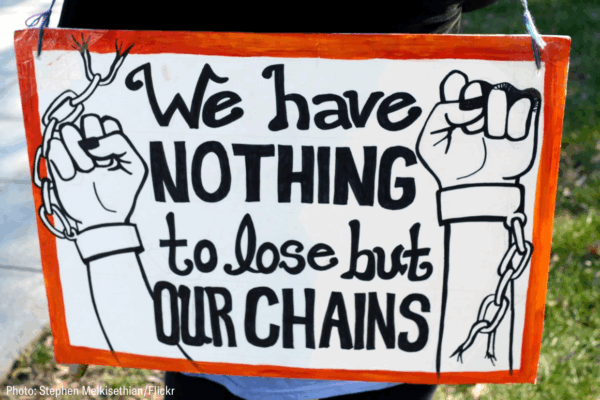On July 1, hundreds of new laws passed by the Virginia General Assembly earlier this year went into effect. The Virginia legislature made great strides and greenlit a handful of important reforms that had been rejected time and time again in the past. Rather than attacking people’s rights and freedoms, lawmakers passed legislation that made it easier for people to vote, expanded abortion access, protected LGBTQ+ people from discrimination and started chipping away at the countless injustices in our criminal legal system.
Some of these new laws include:
Voting rights
Before the 2020 legislative session, Virginia was ranked 49th out of 50 states when it came to how difficult it was to cast your ballot. That’s partly because our voter registration process was difficult and riddled with discriminatory barriers, our photo ID law was overly restrictive, and our excuse-based absentee voting system favored some classes of voters over others. For years, these barriers to the ballot box had disproportionately suppressed Black and brown people, people with low incomes, people with disabilities, and other marginalized groups.
Many of those unnecessary hurdles that kept people from participating in our democracy were finally removed this year. Fighting alongside the League of Women Voters of Virginia, New Virginia Majority, and many other partners, we were proud of four collective wins for voting rights:
- Voters are no longer required to provide an excuse in order to vote absentee by mail or in person.
- Effective 2022, same-day voter registration will become a reality for all Virginians, which is expected to increase voter turnout by 7-10%, or 850,000 additional Virginia voters.
- Voters will not need a photo ID to cast their ballots, although they are still required to provide an approved form of identification, like a utility bill.
- Election Day has been declared a state holiday, replacing the racist Lee-Jackson Day.
Criminal legal reforms
While Virginia lawmakers have made great progress expanding ballot access in Virginia, they lag behind on criminal legal reform. This session, lawmakers ignored, amended or voted against legislation that would have made the greatest impact on reducing racial disparities in our criminal legal system. Instead of taking the bold steps needed for meaningful, racially just reform, the Virginia General Assembly settled for half measures, such as:
- Lessening the penalty for simple marijuana possession while refusing to take away a racist policing tool historically wielded against Black and Brown people.
- Raising the felony larceny threshold from $500 to $1,000 while failing to eliminate the three-strike petit larceny statute, which automatically turns the third theft charge into a felony, regardless of the person’s circumstance or the amount stolen. These punitive laws do nothing to protect public safety or address the root causes of crime, like poverty, substance abuse and systemic inequities.
- Studying solitary confinement in local and regional jails while delaying putting an end to this cruel practice in state prisons.
- Ending the regressive practice of driver’s license suspension for failure to pay court debts (thanks to leadership from Legal Aid Justice Center), which had perpetuated an unfair, wealth-based criminal legal system. At the same time, the legislature rejected reforms to Virginia’s pretrial detention system, which treats people differently based on the size of their wallets.
Gender equity
Major victories on this front include the historic passage of the Virginia Values Act (VVA) and the Pregnant Workers Fairness Act (PWFA). With the VVA, Virginia became the first southern state to pass comprehensive nondiscrimination protections for LGBTQ+ people in housing, employment, credit and public accommodations.
The PWFA makes it illegal for employers to discriminate or fire people simply because they’re pregnant or nursing. It also requires employers to provide reasonable accommodations for pregnant and nursing workers on the job. While banning discrimination does not necessarily mean that discrimination will go away, these civil rights protections bring Virginia law into the 21st century and give Virginians the legal tool to challenge discrimination when it happens.
Abortion access
For years, the Virginia General Assembly has not respected people’s right to an abortion, passing laws that targeted abortion providers and restricted access to abortion care and other essential services these facilities provide. This year, the passage of the Reproductive Health Protection Act repealed Virginia’s harmful laws restricting abortion access, including the two-trip requirement, mandatory ultrasounds, and the physicians-only requirement for giving medication abortions.
While lawmakers and the governor are often the first people to be credited for this year’s historic legislative session, these victories are the fruits of years of tireless, persistent, non-glamorous advocacy work by community leaders and activists all over Virginia. These are ordinary people who took time off work to show up at committee hearings, waited for hours to testify only for a few minutes, overcame crushing disappointment when the bills they supported died over and over again, and then picked up their spirits and kept on fighting. They’re the people who deserve to be honored and celebrated as we look forward to a new era in Virginia.
Progress takes time. It also takes hard work, resilience, solidarity and even pain. This landmark legislative session belongs not only to the advocates of our time, but also to all those who came before us, who spoke up and took a stand for justice even when it wasn’t easy to do so.


